Fallbrook Podiatry
Your Feet in Kind Hands

Effective
Immediate & Permanent
Solution for Ingrown Toenails
Treat yourself kindly. Allow our seasoned professional to gently alleviate your discomfort.
It's time to let go of the pain with care you can trust.
No Insurance? No Problem.
Consultation is Free.*
Ingrown Toenails
What do we offer?
We offer a range of options, including permanent and non-permanent resolutions for ingrown toenails. We will help you to find the best solution for your needs.
We will fix your ingrown toenail on the same day as the initial appointment.
Time
Your time is essential. Appointments are generally available on the same day or the next business day.
Late hours are available by request.
We will work with your schedule.
Quality
- Twenty years' experience providing clinical care and thousands of gently and successfully resolved ingrown toenails, leading to the improved lives of their happy owners.
Communication
Dr. Patish will fully educate you on all available treatment options.
You will receive clear, comprehensive, and easy-to-follow aftercare instructions.
You will get a callback and a follow-up appointment.
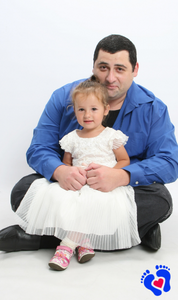


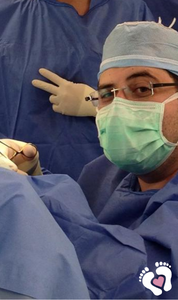

Peace of Mind
Dr. Patish has been making people with ingrown toenails happy for over 20 years, successfully resolving thousands of ingrown toenails.
I have had two decades to "practice."
Now I can enjoy taking good care of my clients.
- Dr. Patish
Doctor
Meet Your Foot Doctor
Ingrown Toenails
Important Information
Dangers & complications of ingrown toenails, reasons why nails have grown in, signs & symptoms, home remedies, prevention.
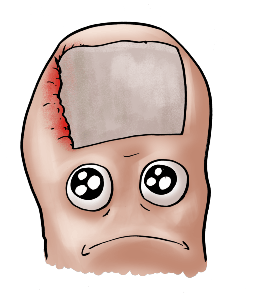
There is very little soft tissue that separates the nail from the bone. Prolonged toe infections, often due to ingrown toenails, can cause the bone to get infected ("osteomyelitis"). Bone infection can lead to toe amputation and sometimes amputation of the whole foot.
Call your foot doctor immediately if you suspect a toe/toenail infection.
Infection of the toe can also cause the nail to permanently become disfigured, unsightly, or lead to permanent loss of a toenail.

Listed below are the most common causes of ingrown toenails:
Improper shoes are tight shoes that do not let your toes move freely, crowding your toes, and high heels with narrow tips.
Are you cutting the toenails too short? Are you digging into corners, trying to get extra perfect round toenails, especially during pedicures?
Did you injure the toenail? Dropping a heavy object onto the toe, aggressive/explosive take-offs during sports or long-distance running often damage the toenails.
Unusually curved toenails - genetics - thanks, mom and dad!

Suppose you have the following signs and symptoms in your toe (most commonly big toe). In that case, you are very likely suffering from an ingrown toenail:
Pain, especially in shoes, and especially when walking. Pain is one of the symptoms of infection.
Tenderness. Tenderness happens before pain sets in. Tenderness is another symptom of infection. Time to start thinking about seeing a foot doctor. Don't let your ingrown toenails get out of hand!
Redness. Redness is one of the signs of infection.
Swelling. Swelling is another sign of infection.
Discharge. Discharge is a sure-fire sign of active infection. No time to wait! You have an active infection. Time to CALL your podiatrist, take action! At the very least, you need to be on antibiotics; otherwise, there is a significant risk of losing a toe, especially in people with diabetes or poor circulation. But anyone can be in danger.
Smell. Malodor is an EMERGENCY; if you have an odor coming from a Red / Hot / Swollen toe with white or yellow discharge coming out any part of the toe, this is an EMERGENCY!!! Call 911
DO
Soak your feet in warm water. Do this three to four times a day. Soaking reduces swelling and relieves tenderness. SOAKING INSTRUCTIONS HERE.
Apply antibiotic cream. Put antibiotic ointment on the tender area and bandage the toe.
Choose well-fitting footwear. Consider wearing open-toed shoes or sandals until your toe feels better. Your feet are not the same size as 20 years ago, especially the width. Check your shoe size regularly. Feet change size throughout your lifetime. We can help you to check your correct shoe size.
DO NOT
Place cotton or dental floss under your toenail. I genuinely do not know who came up with the idea of shoving stuff that can accumulate infection into a tiny overcrowded space between nail and nail bed? Bad Idea.
Take pain relievers for more than two days. Over-the-counter pain relievers will help ease the toe pain. However, if you need painkillers to help you walk because of toe pain - TIME TO SEE A DOCTOR! Taking all those medications for prolonged periods can cause permanent damage to the LIVER, KIDNEY, STOMACH (and other organs too).
Who came up with cutting the "wedge" in the center of the nail? Hashtag Medieval Torture. Not only are you likely to end up with a permanently deformed toenail, but you will also very likely cause an infection.
Prevention of ingrown toenails:
Trim your toenails straight across. Don't curve your nails to match the shape of the front of your toe. If you have your toenails done at a salon, be sure to tell your pedicurist to trim your nails straight across (French pedicure?). If you have a condition that causes poor blood flow to your feet and you can't cut your nails, see a podiatrist regularly to have your nails trimmed and your feet checked.
Keep toenails at a moderate length. Trim toenails, so they're even with the tips of your toes. If you trim your toenails too short, the pressure from your shoes on your toes may direct a nail to grow into the tissue. If you leave your toenails too long, there is a strong chance for injury from shoes and even socks if your toenails snag on the socks and the nail gets ripped off the nailbed. Additionally, overly long toenails are a sure-fire invitation for fungus to settle in.
Wear shoes that fit correctly. Shoes that put too much pressure on your toes or pinch them may cause a nail to grow into the soft tissue of your toe. If you have nerve damage to your feet (from diabetes or chronic back problems), you may not be able to sense if your shoes fit too tightly. Take care to buy and wear shoes that fit correctly, preferably from a shoe store specializing in fitting shoes for people with foot problems. Talk to your podiatrist about the proper size of shoes you should be wearing. We have the right measuring tools in our clinic. Just Ask.
Wear protective footwear. If your work puts you at risk of injuring your toes, wear protective footwear, such as steel-toed shoes, make sure they fit well!
Check your feet. If you have diabetes or poor circulation, check your feet daily for signs of ingrown toenails or other foot problems.
Kind Words
Reviews From Our Wonderful Customers
Professional, 10/10, truly competent, pleasant, kind, personable, funny, knowledgeable, very friendly staff, great service and hospitality, gentle, amazing bedside manner, prompt, exceeded expectations, courteous, life changer...
from Google, Yelp, ZocDoc & HealthGrades reviews
FORMS & INFOGRAPHICS
Like to get everything done faster? Easy!
Instructions After Ingrown Toenail Removal Procedure
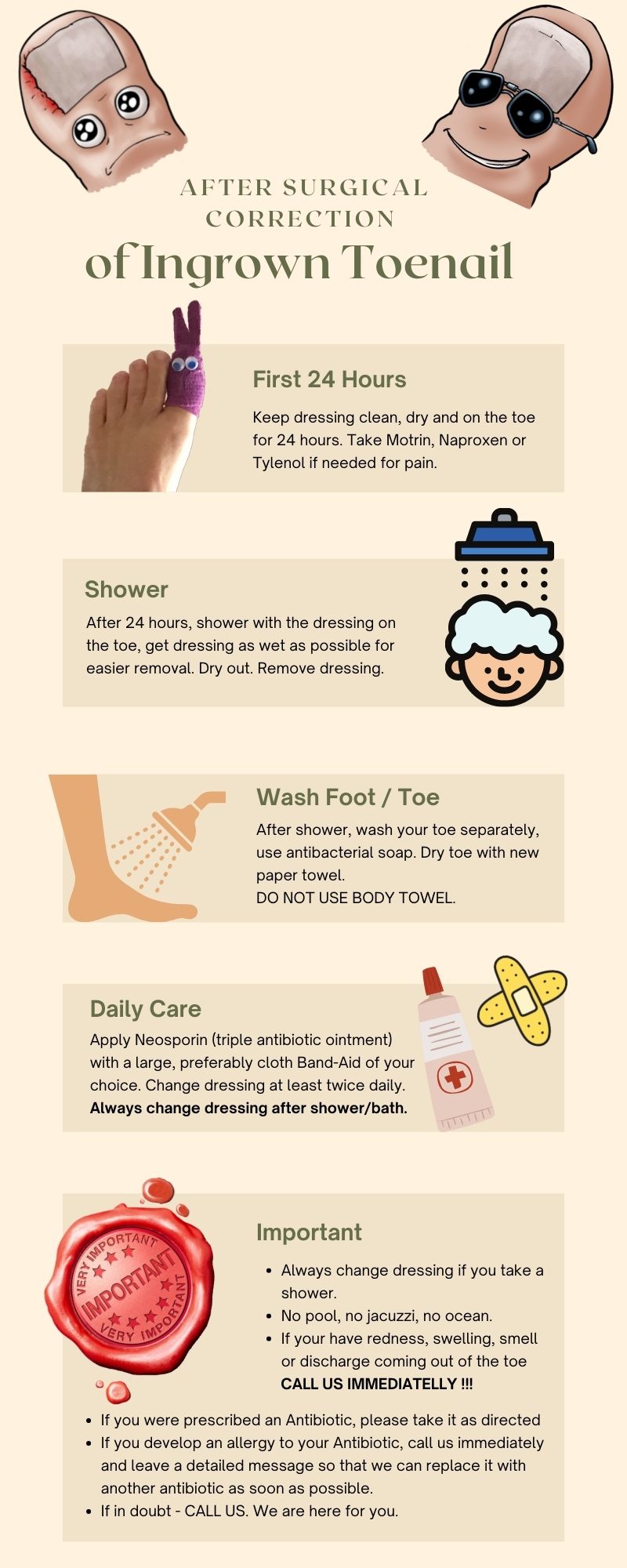
Foot Soaking Instructions
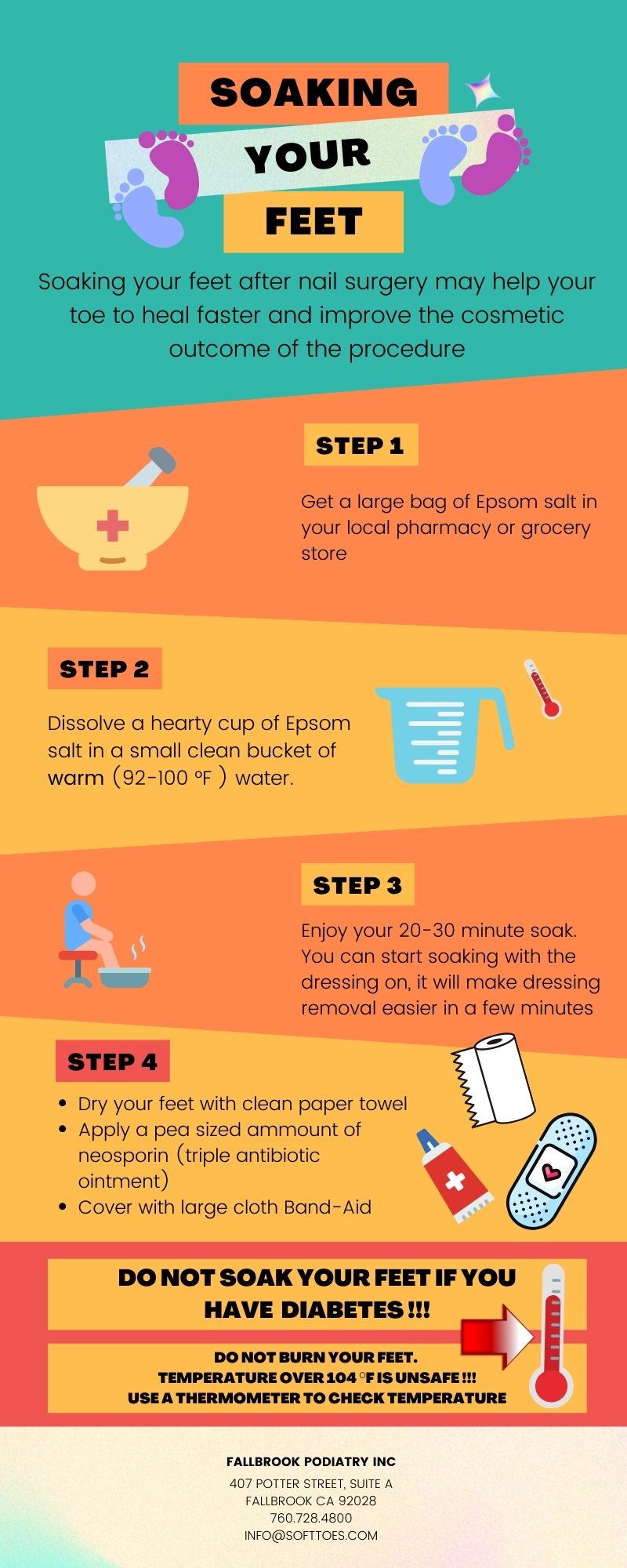
Get in Touch!
It is time to say "Good-Bye" to those pesky ingrown toenails for good! Get in touch with us via this contact form, email, phone call, or text message, and we will set up a consultation.



























